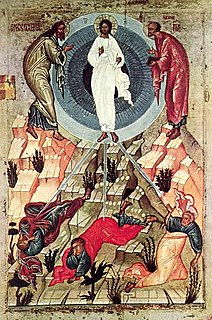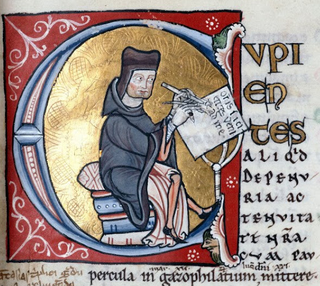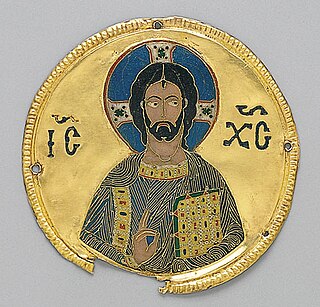Related Research Articles

Bernard of Clairvaux, venerated as Saint Bernard, was a Burgundian abbot and a major leader in the revitalization of Benedictine monasticism through the nascent Cistercian Order.

William of Ockham was an English Franciscan friar, scholastic philosopher, and theologian, who is believed to have been born in Ockham, a small village in Surrey. He is considered to be one of the major figures of medieval thought and was at the centre of the major intellectual and political controversies of the 14th century. He is commonly known for Occam's razor, the methodological principle that bears his name, and also produced significant works on logic, physics, and theology. William is remembered in the Church of England with a commemoration on 10 April.
The 1130s was a decade of the Julian Calendar which began on January 1, 1130, and ended on December 31, 1139.

Scholasticism was a medieval school of philosophy that employed a critical method of philosophical analysis predicated upon a Latin Catholic theistic curriculum which dominated teaching in the medieval universities in Europe from about 1100 to 1700. It originated within the Christian monastic schools that were the basis of the earliest European universities. The rise of scholasticism was closely associated with these schools that flourished in Italy, France, Spain and England.
Guillaume de Champeaux, known in English as William of Champeaux and Latinised to Gulielmus de Campellis, was a French philosopher and theologian.

Jacques Maritain was a French Catholic philosopher. Raised Protestant, he was agnostic before converting to Catholicism in 1906. An author of more than 60 books, he helped to revive Thomas Aquinas for modern times, and was influential in the development and drafting of the Universal Declaration of Human Rights. Pope Paul VI presented his "Message to Men of Thought and of Science" at the close of Vatican II to Maritain, his long-time friend and mentor. The same pope had seriously considered making him a lay cardinal, but Maritain rejected it. Maritain's interest and works spanned many aspects of philosophy, including aesthetics, political theory, philosophy of science, metaphysics, the nature of education, liturgy and ecclesiology.

Peter Lombard, was a scholastic theologian, Bishop of Paris, and author of Four Books of Sentences which became the standard textbook of theology, for which he earned the accolade Magister Sententiarum.
Jocelyn is a surname and first name. It is a unisex (male/female) name. Variants include Jocelin, Jocelyne, Jocelynn, Jocelynne, Jocilyn, Joscelin, Josceline, Joscelyn, Joscelynn, Joscelynne, Joseline, Joselyn, Joselyne, Joslin, Joslyn, Josselyn, Jostlyne, Josslyn and Joclyn. The name may derive from Josselin, a locality in Brittany, France, and was introduced to England after the Norman Conquest. It may also derive from the Germanic name Gauzlin, also spelled Gozlin or Goslin. It is Latinized as Iudocus or Judocus, from Breton Iodoc, diminutive of iudh ("lord").
Roscelin of Compiègne, better known by his Latinized name Roscellinus Compendiensis or Rucelinus, was a French philosopher and theologian, often regarded as the founder of nominalism.

Étienne Henri Gilson was a French philosopher and historian of philosophy. A scholar of medieval philosophy, he originally specialised in the thought of Descartes, yet also philosophized in the tradition of Thomas Aquinas, although he did not consider himself a Neo-Thomist philosopher. In 1946 he attained the distinction of being elected an "Immortal" (member) of the Académie française. He was nominated for the Nobel Prize in Literature.

Robert I of Dreux, nicknamed the Great, was the fifth son of Louis VI of France and Adélaide de Maurienne.
Milo I the Great was lord of Montlhéry from 1095 until his death. He was the son of Guy I of Montlhéry and Hodierna of Gometz.

Jean Cholet was a French cardinal and Doctor utriusque iure at the University of Paris. His diplomatic skills helped prevent a duel between the kings of France and Aragon. He served as Papal Legate in France, and was responsible for organizing the Aragonese Crusade of 1283–84. He was then a working member of the Roman Curia.
Longpont Abbey was a Cistercian monastery, in present-day Longpont, Aisne, France.
Raoul le Bon ', also known as Raoul III de Nesle, was the Count of Soissons from 1180. He was the third son of Raoul II de Nesle and Gertrude de Montaigu.

Christianity in the 12th century was marked by scholastic development and monastic reforms in the western church and a continuation of the Crusades, namely with the Second Crusade in the Holy Land.
Ralph Matthew McInerny was an American author and philosophy professor at the University of Notre Dame. McInerny's most popular mystery novels featured Father Dowling, and was later adapted into the Father Dowling Mysteries television show, which ran from 1987 to 1991.

Stealing Heaven is a 1988 film directed by Clive Donner and starring Derek de Lint, Kim Thomson and Denholm Elliott. It is a costume drama based on the French 12th century medieval romance of Peter Abelard and Héloïse and on a historical novel by Marion Meade. This was Donner's final theatrical film, before his death on 7 September 2010.

Peter Abelard was a medieval French scholastic philosopher, leading logician, theologian, teacher, musician, composer, and poet.
Hodierna (Hodierne) of Gometz, sister of William, Lord of Gometz, and wife of Guy I of Montlhéry. She made great donations to the new religious of the order of Saint-Benoît, installed in the Notre-Dame-de-Bonne-Garde Basilica of Longpont-sur-Orge, a monastery founded by her husband. Guy obtained the concession of the church of Long Pont in 1061 of Godfrey, Bishop of Paris. According to Gallia Christiana: "She herself went to Cluny to obtain from the abbot a certain number of monks; And she presented to the abbey a golden chalice of thirty ounces and a precious chasuble.”
References
- Annales de la vie de Joscelin de Vierzi in Achille Luchaire, Quatrièmes mélanges d'histoire du moyen age, Paris: Alcan, 1905.
- Desmond Paul Henry, Medieval Mereology, Amsterdam: B. R. Grüner., 1991.
- Pseudo-Joscelin, Treatise on Genera and Species, edited and translated with an introduction by Peter King, Oxford Studies in Medieval Philosophy, 2, 2014, pp. 104–210.